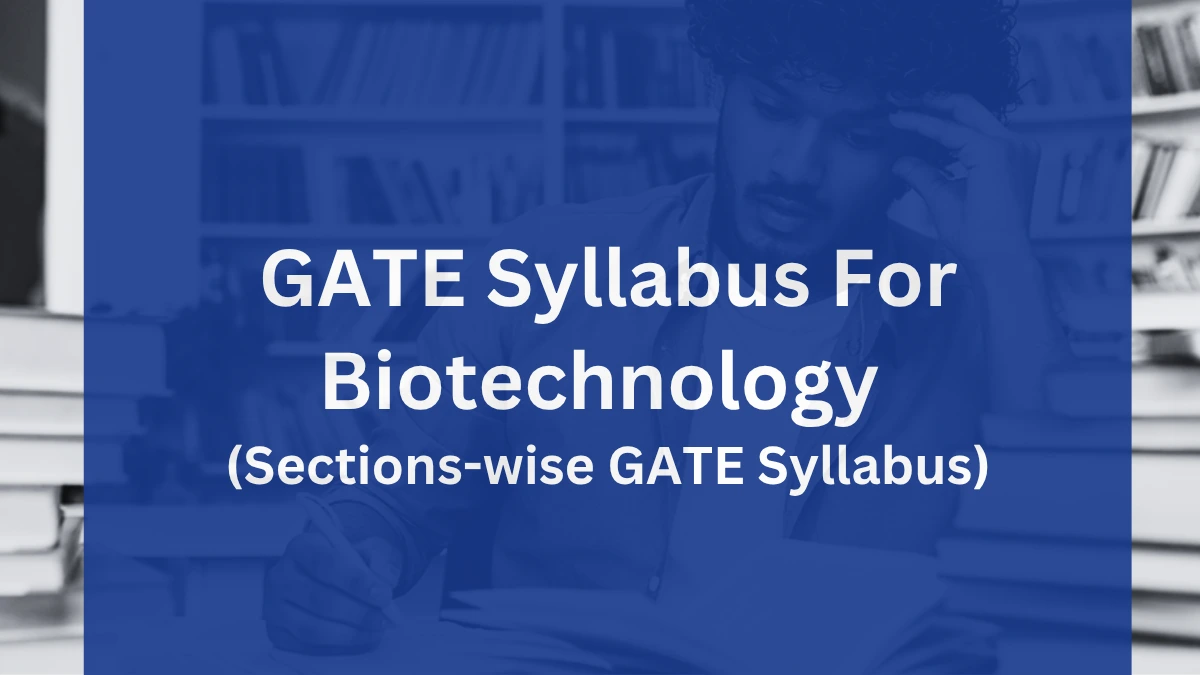GATE Syllabus For Biotechnology 2026: Sections-wise GATE Biotechnology Syllabus
GATE Biotechnology is one of 29 disciplines in which the GATE exam is conducted each year & provides aspirants with a strategy for planning their preparation. The candidates who select biotechnology as their subject should check the complete GATE Biotechnology Syllabus to know what topics to prepare for. The GATE Biotechnology syllabus covers topics and subtopics from the graduate level, which may be asked in the exam. The key to clearing the GATE exam is to understand the syllabus thoroughly.
Read More: GATE Mechanical Engineering Syllabus 2026
GATE Syllabus For CSE 2026
Sections of GATE Biotechnology Syllabus 2026:
- Engineering Mathematics
- Genetics and Cellular Biology
- Recombinant DNA Technology and other tools in Biotechnology
- Fundamentals of Biological Engineering
- Plant, Animal Microbial Biotechnology
- Bioprocess Engineering Process Biotechnology.
- General Biotechnology
Let’s look at each section of the GATE 2026 syllabus for Biotechnology (BT):
1. Engineering Mathematics Syllabus for Biotechnology
The Engineering Mathematics section of the GATE Biotechnology Syllabus is a prerequisite to many engineering courses in the GATE examination. Engineering Mathematics Syllabus comprises sections like calculus, linear algebra, analysis of complex variables, differential equations, numerical methods, and probability and statistics. Below is a breakdown of the topics:
| Section | Topics |
| Linear Algebra | Linear Algebra includes topics such as systems of linear equations, matrix algebra, systems of linear equations, Eigenvalues, consistency and rank, Eigenvalues, and Eigenvectors. |
| Calculus | Calculus covers topics including theorem of integral values, mean value theorems, partial derivatives, minima and maxima, Fourier series, multiple integrals, line, vector identities, surface and volume integrals, Green’s theorems, Stokes and Gauss. |
| Differential Equations | The differential equations include first-order equations, second-order linear differential equations with constant coefficients, method of variation of parameters, Cauchy’s and Euler’s equations, initial and boundary value problems, and solution of partial differential equations: Variable separable method. |
| Analysis of complex variables | Analysis of complex variables covers topics such as Cauchy’s integral theorem, analytic functions, integral formula, Residue theorem, Taylor’s and Laueant’s series, and solution of integrals. |
| Probability and Statistics | Probability and Statistics include topics such as standard deviation, sampling theorems, conditional probability, mode, mean, median, variance and standard deviation, and Random variables: Discrete and continuous distributions, normal, Poisson, and binomial distributions. |
| Numerical Methods | Numerical Methods cover topics such as solutions of non-linear algebraic equations, Matrix inversions, numerical integration, iterative methods for solving differential equations, and correlation analysis. |
2. General Biotechnology Syllabus
This section of general biotechnology includes important topics such as:
1. Competence
2. Uncompetitive Inhibition
3. Immunization
Here are some topics to consider:
| Sections | Topics |
| Biochemistry | Biomolecules– Structure and function, Molecular motors, Biological membranes, transport processes, and action potential, lipids, amino acids, and nucleic acids, basic concepts and regulation of the metabolism of carbohydrates, photosynthesis, respiration, and electron transport chain. |
| Microbiology | The microbiology section involves bacterial classification and diversity.
Microbial Ecology– Microbes in freshwater, marine, and terrestrial ecosystems, and Microbial interactions. Viruses include- Structure and classification, methods in microbiology, microbial growth and nutrition, nitrogen fixation, microbial diseases and host-pathogen interactions, antibiotics, and anti-microbial resistance. |
| Immunology | Immunology covers topics like innate and adaptive immunity, humoral and cell-mediated immunity, anti-body structure and function, the molecular basis of antibody diversity, T cell, and B cell development, antigen-antibody reaction, complement, primary and secondary lymphoid organs, major histocompatibility complex (MHC), antigen processing and presentation, polyclonal and monoclonal antibody, regulation of immune response, immune response tolerance, hypersensitivity, auto-immunity, Graft versus host reaction, immunization, and vaccines. |
3. Genetics and Cellular Biology Syllabus
Genetic and Cellular Biology Syllabus of GATE Syllabus For Biotechnology (BT) covers topics like:
1. Extracellular Matrix
2. Genetic Disorders
3. Molecular Structure of genes and chromosomes.
Below are some key topics covered in this section:
1. Genetics and Evolutionary Biology: This section of GATE Biotechnology Syllabus 2026 covers topics like gene interaction, Mendelian inheritance, linkage, complementation, recombination and chromosome mapping, extrachromosomal inheritance, microbial genetics- transformation, transduction and conjugation, Chromosomal variation, Genetic disorders, Population genetics, Epigenetics, Selection and inheritance, horizontal gene transfer and transposable elements, Adaptive and neutral evolution, Genetic drift, Species, and speciation.
2. Cell Biology: The topics covered by Cell Biology include the cell cycle and cell growth control, prokaryotic and eukaryotic cell structure, cell signaling, signal transduction, protein trafficking, post-translational modifications, protein trafficking, extracellular matrix, cell death, and autophagy.
3. Molecular Biology: Molecular Biology encompasses topics like regulation of gene expression, the molecular structure of genes and chromosomes, mutations and mutagenesis, nucleic acid Replication, splicing, translation, and their regulatory mechanism, non-coding and micro RNA, RNA interference, DNA damage, and repair.
4. Bioprocess Engineering and Process Biotechnology Syllabus:
The Bioprocess Engineering and Process Biotechnology section of GATE Biotechnology Syllabus 2026 includes important topics like Filtration, tuning of controllers, and Thiele modulus.
The key topics covered in this section include:
- Upstream and Downstream processing: Upstream and Downstream processing encompasses a variety of topics like media formulation and optimization, sterilization of air and media, filtration- membrane filtration, ultra-filtration, Centrifugation- High speed and ultra, Cell disruption, Principles of chromatography- ion exchange, hydrophobic interaction, gel filtration, affinit, GC, FPLC, HPLC, adsorption, drying, and extraction.
- Bioreaction Engineering: Bioreaction Engineering consists of topics like first-order kinetics, rate law, zero, and first-order kinetics. Ideal reactors- Batch, mixed flow, and plug flow, Enzyme immobilization, diffusion effects – Thiele modulus, effectiveness factor, Damkoehler number, Kinetics of cell growth, substrate utilization, and product formation, Structured and unstructured models, batch, fed-batch, and continuous processes, Microbial and enzyme reactors, Optimization and scale-up.
- Process Control and Instrumentation: The topics included under process control and instrumentation are temperature, pressure, flow measurement devices, first-order systems, valves, feedback, and feed-forward control, type of controllers- integral control, proportional, derivative, and integral control, and tuning of controllers.
4. Syllabus of Plant, Animal, and Microbial Biotechnology
The plant, animal, and microbial biotechnology of the GATE Biotechnology Syllabus 2026 encompasses topics like:
1. Plastid Transformation
2. Methodology
3. Culture Media Composition
4. Growth Conditions
5. Antibiotics
6. Biofuels
The important topics covered in this section are:
| Section | Topics |
| Plants | Protoplast fusion – Somatic hybrid and cybrid, Transgenic plants– direct and indirect methods of gene transfer techniques, Selection marker and reporter gene, Plastid transformation.
Totipotency– Regeneration of plants, Plant growth regulators and elicitors, Tissue culture, and cell suspension culture system – Methodology, the kinetics of growth and nutrient optimization, production of secondary metabolites, hairy root culture, plant products of industrial importance, artificial seeds, Somaclonal variation, Protoplast, |
| Animals | Animal cell and tissue preservation, culture media composition and growth conditions, anchorage and non-anchorage dependent cell culture, micro-macro-carrier culture, Kinetics of cell growth, micro-macro carrier culture, animal cloning, hybridoma technology, transgenic animals, stem cell technology, knock-out, and knock-in animals. |
| Microbes | Production of biomass and primary/secondary metabolites– Industrial Enzymes, Biofuels, bioplastic, large-scale production and purification of recombinant proteins and metabolites, clinical food, industrial microbiology, screening strategies new products. for |
5. Syllabus of Recombinant DNA Technology and Other Tools in Biotechnology
Recombinant DNA technology and other tools in biotechnology are an important section of the GATE Biotechnology Syllabus. This includes topics like:
1. RAPD
2. DNA library
3. Enzymatic assays
4. RFLP, UV
5. Gene prediction and visible.
Molecular Tools: Molecular Tools covers topics like southern and northern blotting, DNA/RNA labeling and sequencing, DNA fingerprinting, RFLP, RAPD, gene transfer technologies, site-directed mutagenesis, CRISPR-CAS, biosensors, and biosensing.
Recombinant DNA Technology: Recombinant DNA Technology includes topics like Restriction and modification enzymes, Vectors – plasmids, bacteriophage and other viral vectors, cosmids, Ti plasmid, bacterial and yeast artificial chromosomes, Expression vectors, cDNA and genomic DNA library, Gene isolation, and cloning, strategies for the production of recombinant proteins, Transposons, and gene targeting.
Analytical Tools:
Principles of microscopy- Electron, light, fluorescent and confocal
Principles of spectroscopy- Visible, UV, IR, CD, fluorescence, MS,NMR, FT-IR, micro-arrays, electrophoresis, Immunoassay
Enzymatic Assays– RIA, ELISA, immunohistochemistry, immunoblotting, flow cytometry, whole-genome, and CHIP-sequencing.
Computational Tools: Computational Tools covers topics like search tools and bioinformatics resources, sequence and structure databases, sequence analysis- Sequence file formats, alignment, scoring matrices, genomics, phylogeny, metabolomics, proteomics, phylogeny, metabolomics, functional annotation, gene prediction, secondary structure, and 3D structure prediction, metagenomics, knowledge discovery in biochemical databases, systems biology, and metabolic engineering.
Paper Pattern for GATE Syllabus For Biotechnology (BT)
| Paper | Biotechnology |
| Paper Code | BT |
| Examination Mode | Computer Based Test |
| Duration | 3 hrs (180 mins) |
| Marking scheme | (a) Multiple Choice Questions (MCQ) (b) Multiple Select Questions (MSQ) and/or Numerical Answer Type (NAT) Questions |
| Negative Marking | For a wrong answer selected in an MCQ, a negative mark will be given. For 1-mark MCQ: 1/3 mark will be deducted for a wrong answer. For 2-mark MCQ: 2/3 mark will be deducted for a wrong answer. NO negative marking for MSQ & NAT. |
| Number of Questions | 10 (GA) + 55 (subject) = 65 Questions |
| General Aptitude (GA) Marks | 15 marks |
| Subject Marks | 85 marks |
| Total marks | 100 marks |
Read more: GATE Exam Pattern 2026 – Subject-Wise Question Paper Pattern, Marking Scheme
FAQs on GATE Syllabus For Biotechnology 2026
What is the GATE Syllabus For Biotechnology (BT)?
GATE Syllabus for Biotechnology 2026 comprises topics from sections like:
1. General Biotechnology
2. General Biotechnology
3. Engineering Mathematics
4. Genetics and Cellular Biology
5. Plant, Animal Microbial Biotechnology
6. Recombinant DNA Technology and other tools in biotechnology
7. Bioprocess Engineering Process Biotechnology.
How can I prepare for GATE Syllabus For Biotechnology (BT) in three months?
You can prepare for the GATE Syllabus For Biotechnology 2026 in just three months by following
the below-mentioned tips and tricks:
1. Continue solving and analyzing past year’s question papers
2. Keep yourself acquainted with the GATE biotechnology syllabus.
3. Clear the basic concepts by reading good study material.
4. Make a schedule for revision.
As per the GATE Syllabus For Biotechnology (BT), which section has the highest weightage?
According to the GATE Biotechnology Syllabus, the topic with the maximum weightage in the exam is animal, plant, and microbial technology having a weightage of approximately 20 marks.
Does the GATE Syllabus For Biotechnology (BT) change every year?
GATE Biotechnology Syllabus is released every year on the official website of the organizing institute. Candidates should download the latest PDF to keep up to date with the revised syllabus.
What are the books recommended for GATE Biotechnology Syllabus?
The top-recommended books to cover the GATE 2026 syllabus for Biotechnology (BT) are:
1. Prescott’s Microbiology by Michael Pelczar
2. Biotechnology: Expanding Horizons by B.D. Singh
3. Principles of Genetics by Gardner, Snustad, and Simmons
4. Biochemistry by Chakrapani and Satyanarayana.
What is GATE Biotechnology?
GATE Biotechnology is designed to evaluate the student’s knowledge and understanding of various aspects of technology, including engineering, mathematics, chemistry, and biology. GATE Biotechnology scores are utilized for admission to postgraduate programs in bioinformatics, and related fields.








